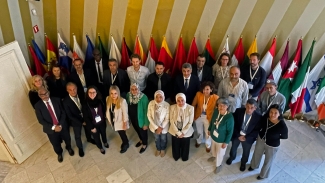Preparing the Mediterranean for the EU Deforestation Regulation

The Mediterranean is more than a geographic bridge between continents; it is a hub of cultural, economic, and environmental interdependence. While many countries in the region are not primary producers of European Union Deforestation Regulation (EUDR)-regulated commodities such as cocoa, coffee, and soya, they play a decisive role as processors, transit hubs, and re-exporters. As a result, the EUDR will significantly shape the future of trade, investment, and sustainable development across the region.
For Mediterranean countries, the EUDR presents both challenges and opportunities. Adapting to the new compliance framework requires capacity-building, robust traceability systems, and coordination across governments, the private sector, and civil society. At the same time, it provides a unique opportunity to modernise value chains, align with the EU Green Deal objectives, and position the region as a trusted partner in sustainable trade. Recognising this, the Union for the Mediterranean (UfM), supported by German development cooperation implemented by GIZ, commissioned the European Forest Institute’s Mediterranean Facility (EFIMED) to prepare a Scoping Study on the Impact of the EUDR on Mediterranean Countries. The study highlights:
- Critical gaps in infrastructure, technical capacity, and regulatory awareness.
- The potential impact on southern and eastern Mediterranean countries as transit, processing, and re-export hubs.
- Opportunities to strengthen regional cooperation and technical preparedness.
Building on the study, an EUDR Mediterranean Workshop on Advancing Regional Readiness and Compliance was held on 15–16 October 2025 at the UfM headquarters in Barcelona. The workshop brought together representatives from trade institutions, ministries, SMEs, larger businesses, and academic experts from South and Eastern Mediterranean countries to explore practical EUDR compliance scenarios.
The two-day workshop included traceability and due diligence exercises to clarify compliance obligations, case studies on timber processing, and EUDR traceability systems. It also invited insights from Preferred by Nature and from the Spanish EU competent authorities on private-sector readiness. Interactive group exercises identifying responsibilities along supply chains were also conducted. The workshop underscored that tailored approaches are essential, recognising each country’s unique role in global supply chains. It also highlighted the importance of collaboration between governments, businesses, and civil society in preparing for EUDR compliance.
The event reinforced the Mediterranean region’s strategic role in sustainable trade, aligned with the UfM 2030 GreenerMed Agenda, and showcased its potential to transform regulatory challenges into opportunities for innovation, competitiveness, and forest conservation.
Looking forward
The UfM, GIZ, and EFIMED remain committed to supporting Mediterranean countries in implementing the EUDR. By assisting policymakers, businesses, and civil society in navigating this transition, the region can enhance trade resilience, safeguard forests, and contribute to global climate and biodiversity goals.
For more information and to access the full scoping study, click here.